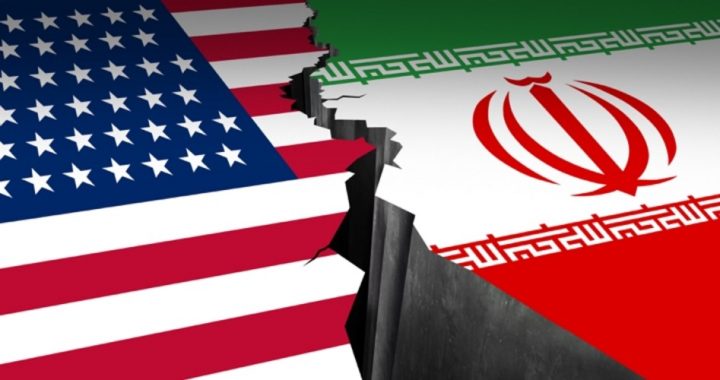
Podcast: Play in new window | Download ()
Subscribe: Android | RSS | More
President Trump told reporters at the White House on Thursday that the U.S. Navy had downed an Iranian drone that it said posed a threat to a U.S. ship in the Strait of Hormuz. According to the president, the USS Boxer — an amphibious assault vessel — “took defensive action” against an Iranian drone that had “closed into a very, very near distance, approximately 1,000 yards.” U.S. Marines aboard the ship jammed the drone and destroyed it.
“This is the latest of many provocative and hostile actions against vessels operating in international waters,” the president said. Trump went on to say that the United States “reserves the right to defend our personnel, our facilities, our interests, and calls upon all nations to condemn Iran’s attempts to disrupt freedom of navigation and global commerce.”
The president said that the drone “was threatening the safety of the ship and the ship’s crew,” and therefore “was immediately destroyed.”
But the Iranians beg to differ.
“We have not lost any drone in the Strait of Hormuz or anywhere else,” tweeted Iran’s Deputy Foreign Minister Seyed Abbas Araghchi. “I am worried that the USS Boxer has shot down their own UAS (Unmanned Aerial System) by mistake!”
The Iranian news agency Tasnim quoted General Abolfazi Shekarchi as saying, “all Iranian drones that are in the Persian Gulf and the Strait of Hormuz, including the one which the U.S. president mentioned, after carrying out scheduled identification and control missions, have returned to their bases.”
Regardless of who destroyed whose drone, tensions in the area have been escalating for the past several months as Iran continues to reel from U.S. sanctions and the further unraveling of the rickety Joint Comprehensive Plan of Action (JCPOA), also known as the Iran Nuclear Deal.
Trump pulled America out of the JCPOA last year, saying that “the Iran deal is defective to its core.” The president also pointed out that the deal only limited Iran’s nuclear activities for a fixed period, failed to keep Iran from developing ballistic missiles and gave the caliphate $100 billion to use as a “slush fund for weapons, terror and oppression.”
In the past four weeks, tensions have escalated dramatically.
On June 20, Iran’s Islamic Revolutionary Guard successfully shot down a U.S. RQ-4A Global Hawk BAMS-D surveillance drone flying over the Strait of Hormuz with a surface to air missile. A retaliatory strike was purportedly ready to be launched before President Trump called it off at the last minute.
On July 1, Iran announced that it had breached a 300 kg cap on producing enriched uranium and had plans to further enrich the uranium so that it could be used for weapons instead of civilian nuclear fuel. Iran claimed that European nations had “failed to fulfill their promises of protecting Iran’s interests under the deal.” The breach of the enrichment quota led to fears that Israel might act unilaterally to take out Iran’s enrichment facilities. Thus, far Israel has not acted on that fear.
On July 4, Great Britain entered the fray by seizing an Iranian tanker off the coast of Gibraltar. The tanker was said to be headed to Syria in violation of U.S. and E.U. sanctions. In response, Iran threatened to seize a British tanker and, in fact, attempted to do so on July 10 before being repulsed by British warships. Iran did succeed in seizing a foreign flag tanker on July 18 that it claimed was smuggling fuel. The country that the tanker belongs to has not yet been made public.
And now the U.S. is sending 500 additional troops to Saudi Arabia in order to fortify the Prince Sultan Air base, which would be on the front line should any larger conflict with Iran break out. In addition, the White House plans to sell precision-guided munitions to Saudi Arabia despite an expected congressional attempt to block the sale.
It’s a dangerous game for President Trump to play. A war with Iran would be unpopular and, given America’s newfound energy independence, the argument that America may need to go to war to maintain its (once) dangerous dependence on foreign oil no longer applies. But regardless of the rationale, the United States should not launch an offensive war against a country that has not attacked us (as, unfortunately, was the case when the U.S. invaded Iraq). Moreover, when the United States does go to war, the decision to do so should be made by Congress (the branch entrusted with the power “to declare war”), not the president.
Graphic: wildpixel/iStock/Getty Images Plus
James Murphy is a freelance journalist who writes on a variety of subjects with a primary focus on the ongoing climate change hoax and cultural issues. He can be reached at [email protected].




